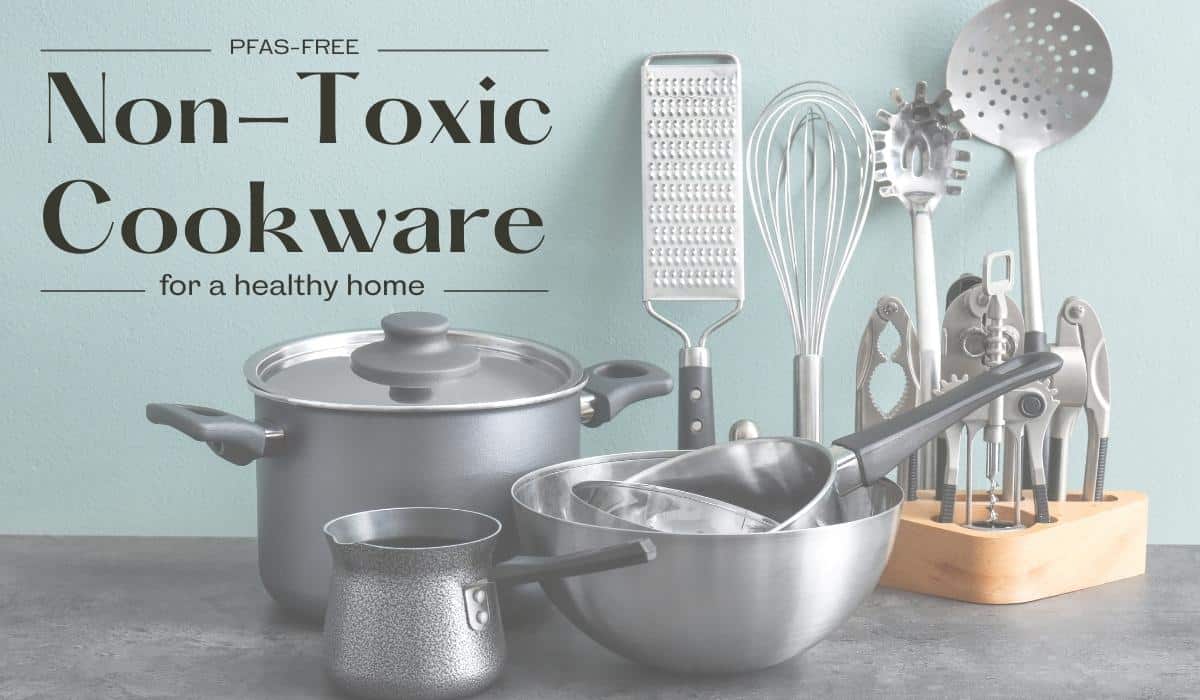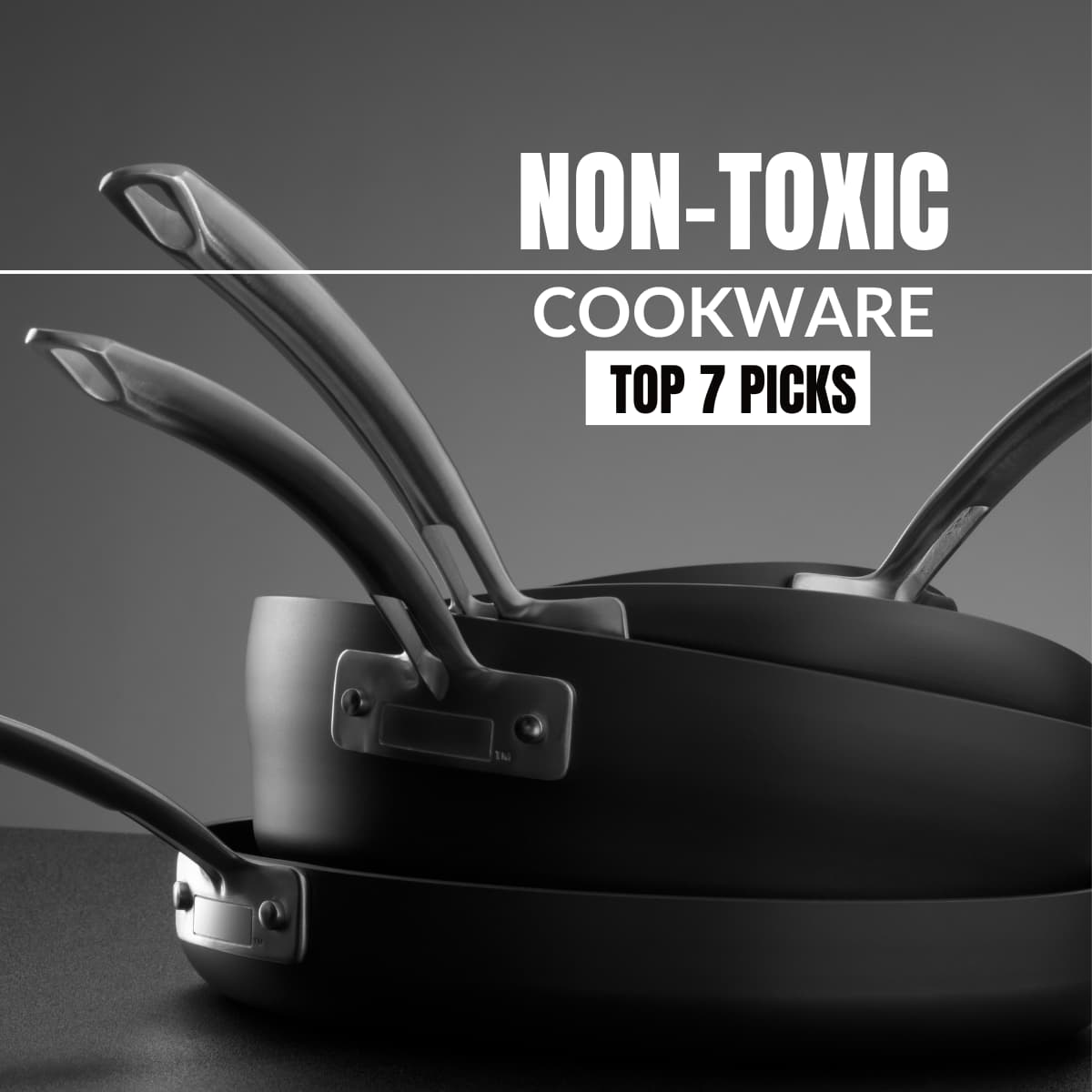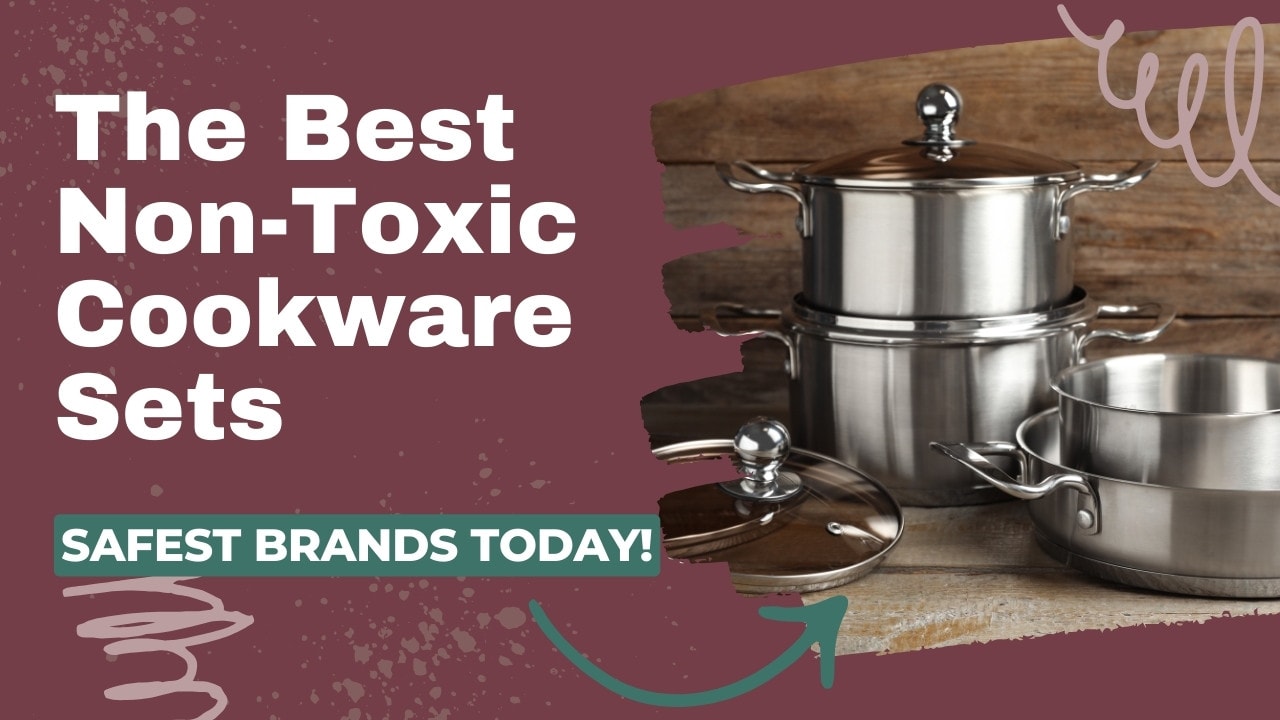As an Amazon Associate, I earn from qualifying purchases
The healthiest cookware to use includes stainless steel, cast iron (enameled), and carbon steel. These options emit no toxins, do not react with ingredients, and are durable for long-term use.
Additionally, stainless steel does not require the use of oil or butter for cooking. Other safe alternatives include ceramic, glass, and enamel-coated cast iron, which prevent risky ingredients from seeping into your food. It is important to prioritize non-toxic cookware to ensure the safety and health of your meals.
Table of Contents
ToggleWhat Is Non-toxic Cookware?
Non-toxic cookware refers to pots and pans that do not release harmful chemicals or toxins into food while cooking. The healthiest cookware to use includes stainless steel, ceramic, glass, and cast-iron options, as they are safe alternatives that minimize the risk of ingesting harmful ingredients.
Definition And Importance
Non-toxic cookware refers to pots and pans that do not release harmful chemicals or metals into the food while cooking. Using non-toxic cookware is important for maintaining a healthy lifestyle as exposure to toxic substances can have long-term effects on our well-being.
Examples Of Non-toxic Cookware:
Here are some examples of non-toxic cookware options that are safe and healthy to use:
- Stainless Steel: Stainless steel cookware is a popular choice for its durability and non-reactive properties. It does not react with food and does not release toxins.
- (Enameled) Cast Iron: Cast iron cookware, when properly seasoned, forms a natural non-stick surface. It can withstand high heat and is known for its excellent heat retention.
- Carbon Steel: Similar to cast iron, carbon steel cookware is versatile and durable. It can handle high temperatures and is perfect for searing and stir-frying.
These cookware options provide a safe and healthy cooking environment, ensuring that the food we prepare is free from any harmful substances. Choosing non-toxic cookware is a smart step towards a healthier lifestyle.

Credit: umbelorganics.com
Top Non-toxic Cookware Picks
When it comes to maintaining a healthy lifestyle, using non-toxic cookware is essential. Non-toxic cookware helps to ensure that no harmful chemicals leach into your food, contributing to a safer cooking experience. Here are some top picks of non-toxic cookware that can be a great addition to your kitchen arsenal:
Best Overall: Caraway Cookware Set
The Caraway Cookware Set stands out as a fantastic non-toxic option for your kitchen. With its ceramic coating and non-stick properties, it offers a safe and convenient cooking experience.
Most Versatile: Our Place Always Pan
The Our Place Always Pan is an incredibly versatile cookware item that can replace multiple kitchen tools. Its non-toxic non-stick coating makes it a great choice for health-conscious cooking.
Best Budget: Greenlife Soft Grip Set
For those looking for an affordable yet non-toxic cookware option, the GreenLife Soft Grip Set is an excellent choice. Its non-stick ceramic coating ensures healthy and easy cooking.
Most Durable: Xtrema Versa Skillet
The Xtrema Versa Skillet is known for its exceptional durability and non-toxic nature. Made with 100% ceramic, it is a sturdy and safe option for your kitchen.
The Safest Materials For Cookware
Looking for the healthiest cookware? Opt for stainless steel, ceramic, glass, or cast-iron pots and pans to avoid any risky chemicals leaching into your food. Say goodbye to toxins and enjoy safe cooking.
Benefits Of Stainless Steel
Stainless steel is a top-quality and durable metal, making it the safest option for your cookware needs. It emits no toxins and does not react with ingredients.
Advantages Of Ceramic Cookware
Ceramic cookware is non-toxic and healthy, making it a great choice for your kitchen. Look for brands like Caraway or GreenLife Soft Grip for the best budget options.
Safety Of Glass And Cast Iron
Glass, like Pyrex cookware, is a safe option for cooking. Cast iron is also safe as long as you avoid high-temperature cooking. For long-term usage, stainless steel pots and pans are recommended.
Non-toxic Cookware Vs. Traditional Cookware
When it comes to your health, the cookware you use plays a significant role in ensuring you’re not exposing yourself to harmful toxins. Let’s delve into the comparison between non-toxic cookware and traditional cookware, and understand why making the switch is beneficial for your well-being.
Potential Risks Of Traditional Cookware
- Traditional cookware may leach harmful chemicals into your food.
- Non-stick cookware with Teflon coating can release toxic fumes when overheated.
- Older aluminum cookware may contribute to high aluminum intake, linked to health issues.
Health Benefits Of Using Non-toxic Cookware
- Non-toxic cookware such as stainless steel is durable and safe for long-term use.
- Glass cookware like Pyrex offers a safe option without any harmful coatings.
- Cast iron cookware can be a great choice if used appropriately and not for high-temperature cooking.
Stainless steel stands out as a top-quality and safe material, emitting zero toxins and ensuring ingredients remain uncontaminated. Say goodbye to the need for excess oil or butter with stainless steel non-stick cookware alternatives like CRISTEL®. Opting for non-toxic cookware not only safeguards your health but also enhances your cooking experience.
Choosing The Healthiest Cookware
Looking for the healthiest cookware options? Consider stainless steel, ceramic, glass, and cast-iron pots and pans. These materials are safe alternatives, free from toxins and risky ingredients, offering a healthier choice for your cooking needs.
Considerations For Selecting Non-toxic Cookware
When choosing the healthiest cookware, it is crucial to consider non-toxic options that are safe for cooking and do not leach harmful chemicals into your food. The materials used in cookware play a significant role in determining its safety and impact on your health. Selecting non-toxic cookware involves considering various factors, including the reactivity of the materials, presence of coatings, and their potential to release toxic substances when heated.
One of the primary considerations for selecting non-toxic cookware is to opt for materials that do not leach harmful chemicals into food, such as stainless steel, cast iron, or ceramic cookware. These materials are known for their inert nature, ensuring that no harmful substances are transferred to the food during cooking.
Additionally, when choosing non-toxic cookware, it is essential to be mindful of any non-stick coatings, as some non-stick cookware may contain harmful chemicals such as perfluorooctanoic acid (PFOA) and perfluorooctane sulfonate (PFOS), which can pose health risks when exposed to high heat. Therefore, selecting cookware with ceramic or other non-toxic non-stick coatings can be a safer alternative.
Tips For Properly Maintaining And Caring For Cookware
Proper maintenance and care for cookware are essential to ensure its longevity and safe usage. Following specific tips for cleaning, seasoning, and storing your cookware can contribute to its optimal performance and prevent any potential health hazards associated with improper maintenance.
Regularly cleaning your cookware using mild dish soap and warm water, especially after cooking acidic or highly-scented foods, can help maintain its non-toxic properties. Avoid using abrasive cleaners or harsh scouring pads, as they can damage the surface and potentially expose harmful materials.
Moreover, proper seasoning and maintaining a protective layer on cast iron cookware can prevent rusting and maintain its non-toxic nature. Storing cookware in a dry and well-ventilated space, away from direct sunlight or moisture, can also prolong its lifespan and prevent any potential contamination or degradation of the materials.

Credit: thehonoursystem.com

Credit: theskillfulcook.com
Frequently Asked Questions On What Is The Healthiest Cookware To Use
What Is The Safest Healthiest Cookware To Use?
The safest and healthiest cookware to use includes stainless steel, ceramic, glass, and cast-iron pots and pans.
What Cookware Is 100% Non Toxic?
For 100% non-toxic cookware, opt for stainless steel, ceramic, glass, cast iron, or enamel-coated options.
Which Type Of Cookware Is Best For Health?
For optimal health, stainless steel, ceramic, glass, and cast-iron cookware are the best choices. These materials do not leach harmful chemicals into food and are safe for long-term use. Avoid non-stick cookware and prioritize non-toxic options for better health.
Is Stainless Steel Or Nonstick Healthier?
Stainless steel is the healthier choice for cookware as it does not emit toxins or react with ingredients. It is durable and does not require oil or butter for cooking. Non-stick pans and pots made of materials such as cast iron, stainless steel, ceramic, glass, and enamel-coated cast iron are also considered safe and low in toxins.
Conclusion
After evaluating the various options, it’s evident that stainless steel, ceramic, glass, and cast-iron cookware stand out as the healthiest choices. These materials minimize the risk of harmful substances seeping into your food, making them ideal for long-term use. Consider these options for a safer and healthier cooking experience.
As an Amazon Associate, I earn from qualifying purchases

